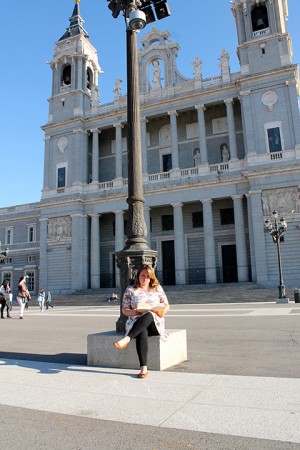

Photo by Leigh Kettle
Reporter
For students wondering if the cost of studying abroad versus at Baylor’s Waco campus, it isn’t very different at all.
Though some students might imagine a semester living somewhere in Europe would be out of their price range, the truth is that if you can afford a semester at Baylor, chances are you can afford a semester abroad, according to Alamogordo, N.M., senior Allison Hainline.
“It’s just like you’re at Baylor,” Hainline said. “Once people understand that then it’s pretty straightforward from there.”
Hainline also works in the study abroad exchange program office and studied in London last semester.
Hainline receives financial aid during the regular semesters and said all of her financial aid package for spring and fall semesters applies to semester study abroad programs, just as they would normally apply to her tuition while in Waco.
This is applicable to 90 percent of students at Baylor, whom, according to the financial aid department, also receive financial aid.
“I registered for my classes in London and all of my scholarship automatically applied,” Hainline said. “I didn’t do anything different.”
Lexi English, the semester study abroad program coordinator, reiterated the idea and said that for the most part studying abroad is financially similar to studying at Baylor.
“All financial aid, loans, grants, all of that applies during regular semester,” English said. “What I do for the students is I make sure the cashier’s office knows they’re in the program and by doing that everything works out.”
The hours that a student studies abroad are charged the same rate as if they were studying in Waco. According to English, students studying abroad can save money because the $1,500 general student fee applied each semester is not charged to those studying abroad.
The directors of the various study abroad programs are eager for students to learn about financial support, English said.
An example of their efforts to reach out to students is the information sessions held twice a week throughout the semester in the W. R. Poage Legislative Library.
“We usually get five to 10 students at each session,” Hainline said. “People are really interested in studying abroad.”
But not every student who is interested in studying abroad believes it is feasible.
Corpus Christi sophomore Amanda Yarger said each time she looked into the possibility it was just too expensive.
“I receive a provost scholarship, which is $5,000 a semester,” Yarger said. “The rest of my expenses are paid purely out of pocket.”
Even though tuition rates would remain the same, the singular added expense of airfare is enough to put a halt to traveling plans.
“The flights I looked into were close to $2,000,” Yarger said.
But this idea that it isn’t financially feasible to study abroad is centered on a myth, according to Jimmy Ilseng, the exchange program and study abroad adviser.
“There are a lot of mechanisms we have in place that can help defeat that myth,” Ilseng said.
Ilseng said scholarships are available and are tailored to specifically meet the needs of students studying abroad.
One such scholarship, the Glennis McCrary Goodrich International Scholarship, offers an award of up to $3,000 for summer semesters and $5,000 for regular semesters.
For those whose financial aid covers a majority if not all of their tuition, the remaining financial aid is returned to the student and can be used to pay for the plane ticket or other expenses while abroad.
According to Ilseng, a majority of the students who study abroad through exchange programs and receive aid like Goodrich end up saving money while abroad compared to what they would have spent living in Waco.
“In London, where the pound is so much stronger than the dollar, there’s a program with Regents College that ends up being much cheaper for students because housing and a food stipend are provided to the student at no extra cost,” Ilseng said.
Ilseng said free housing and meal plans are more common in European countries, which traditionally don’t have student fees.
Bend, Ore., senior Dresden Hasala-Shooks is a current study abroad student and recipient of the Goodrich Scholarship.
She is also an example of how studying abroad can save money.
“What happened with me this semester was I actually didn’t have to pay anything out of pocket because of the Goodrich. I was totally covered,” Hasala-Shooks said. “I actually had money left over for incidentals.”
Hasala-Shooks explained that her financial aid package, which includes grants and scholarships, covered her tuition and most of her housing fees. The money remaining from the Goodrich was returned to her and allows her to travel and shop while abroad in Spain.
Hasala-Shooks has become somewhat of an expert at studying abroad. She previously studied in Argentina and Oxford as part of the summer semester and has noticed the differences between summer and regular semester abroad fees.
The combined cost of the two summer abroad programs for Hasala-Shooks cost more than $20,000, and those were completely out of pocket.
“Financial aid doesn’t apply to summer programs,” Hasala-Shooks said. “But if somebody really wants to study abroad in the summer, and I highly recommend it, there are options like the Goodrich which they can use in the summer. It all depends on the student’s effort.”
Dr. Richard Duran, Baylor professor and associate chair of the modern foreign language department and the division director of French & Italian languages, said studying abroad during the summer is difficult but aid and alternatives do exist.
To aid students, the department awards the Allison Family Foundation Scholarship to usually one student from each language studying abroad during the summer, according to Duran. The scholarship, for the few who receive it, covers the student’s entire program and tuition.
The summer study abroad programs in the modern foreign language department, when considering the program fee and tuition, cost upwards of $10,000, and that doesn’t include airfare.
For those who don’t win the scholarship and can’t afford to study abroad during the summer, Duran advises they consider the regular semester abroad program in France. This allows students a much longer stay in France and all financial aid can be applied.
“If you can afford a semester at Baylor, you can afford a semester in France,” Duran said.
Ilseng, English and Duran each agreed that studying abroad depends on picking the right semester and putting the effort forward.
For more information on the various study abroad program, email the study abroad offices at StudyAbroad@baylor.edu or call (254) 710–4824.





